Accounting for Corporate Social Responsibility: BP's Oil Spill Case
VerifiedAdded on 2021/06/17
|11
|2695
|35
Report
AI Summary
This report examines the 2010 Deepwater Horizon oil spill, analyzing its impact on British Petroleum and exploring various approaches to Corporate Social Responsibility (CSR) accounting. It provides an overview of descriptive performance reporting, quantitative reporting, full cost reporting, sustainability reporting, and integrated reporting. The report recommends sustainability reporting and integrated reporting as the most suitable approaches for BP, emphasizing the importance of transparency, reliable data, and third-party validation to demonstrate a renewed commitment to appropriate corporate social behavior. It discusses the lessons learned from the disaster, highlighting the significance of accurate data, comprehensive reporting, and the integration of financial and sustainability information to avoid 'integration spin'. The report concludes by emphasizing the role of CSR in preventing future environmental disasters and promoting responsible corporate practices, drawing upon the Global Reporting Initiative (GRI) guidelines.
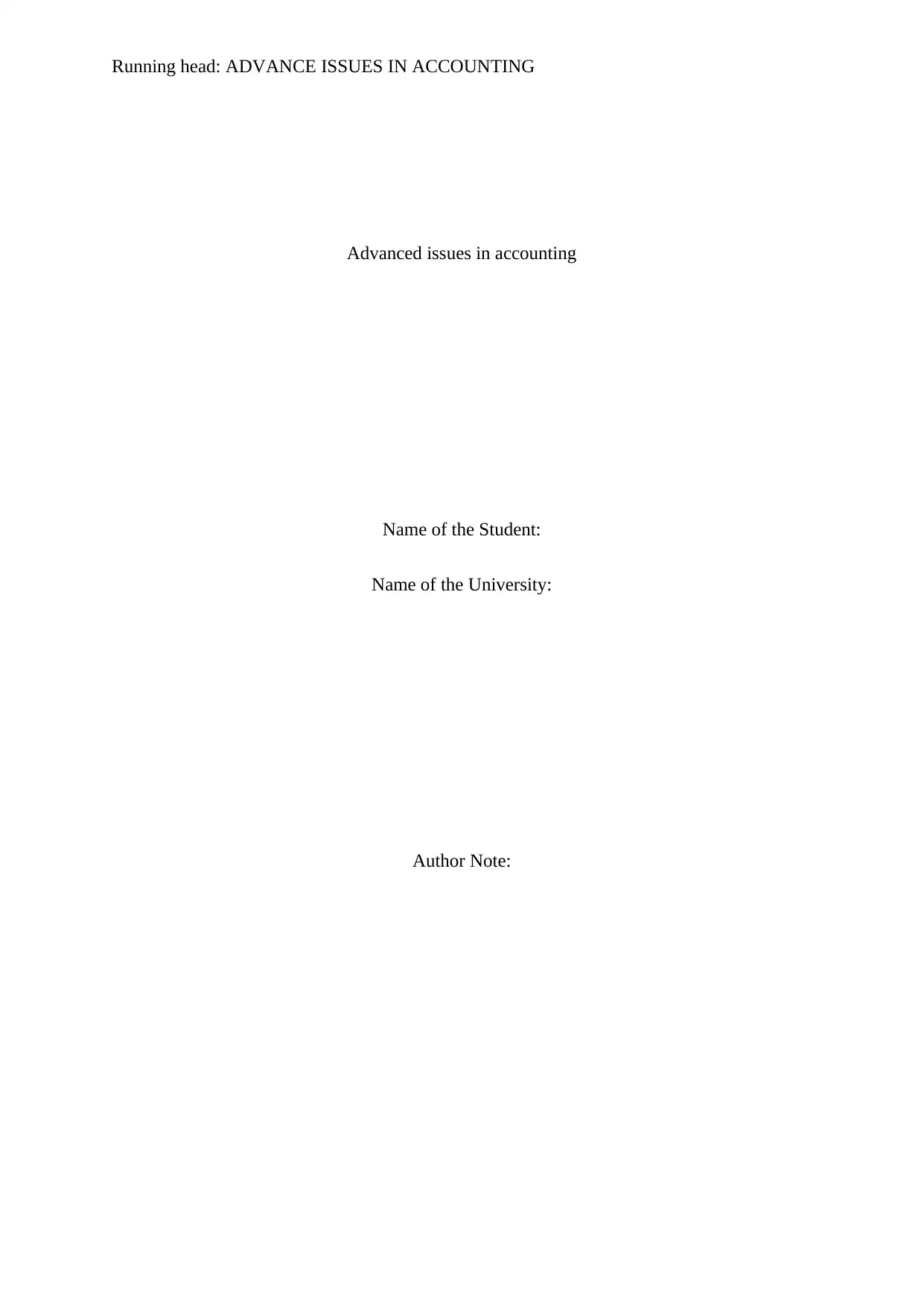
Running head: ADVANCE ISSUES IN ACCOUNTING
Advanced issues in accounting
Name of the Student:
Name of the University:
Author Note:
Advanced issues in accounting
Name of the Student:
Name of the University:
Author Note:
Paraphrase This Document
Need a fresh take? Get an instant paraphrase of this document with our AI Paraphraser
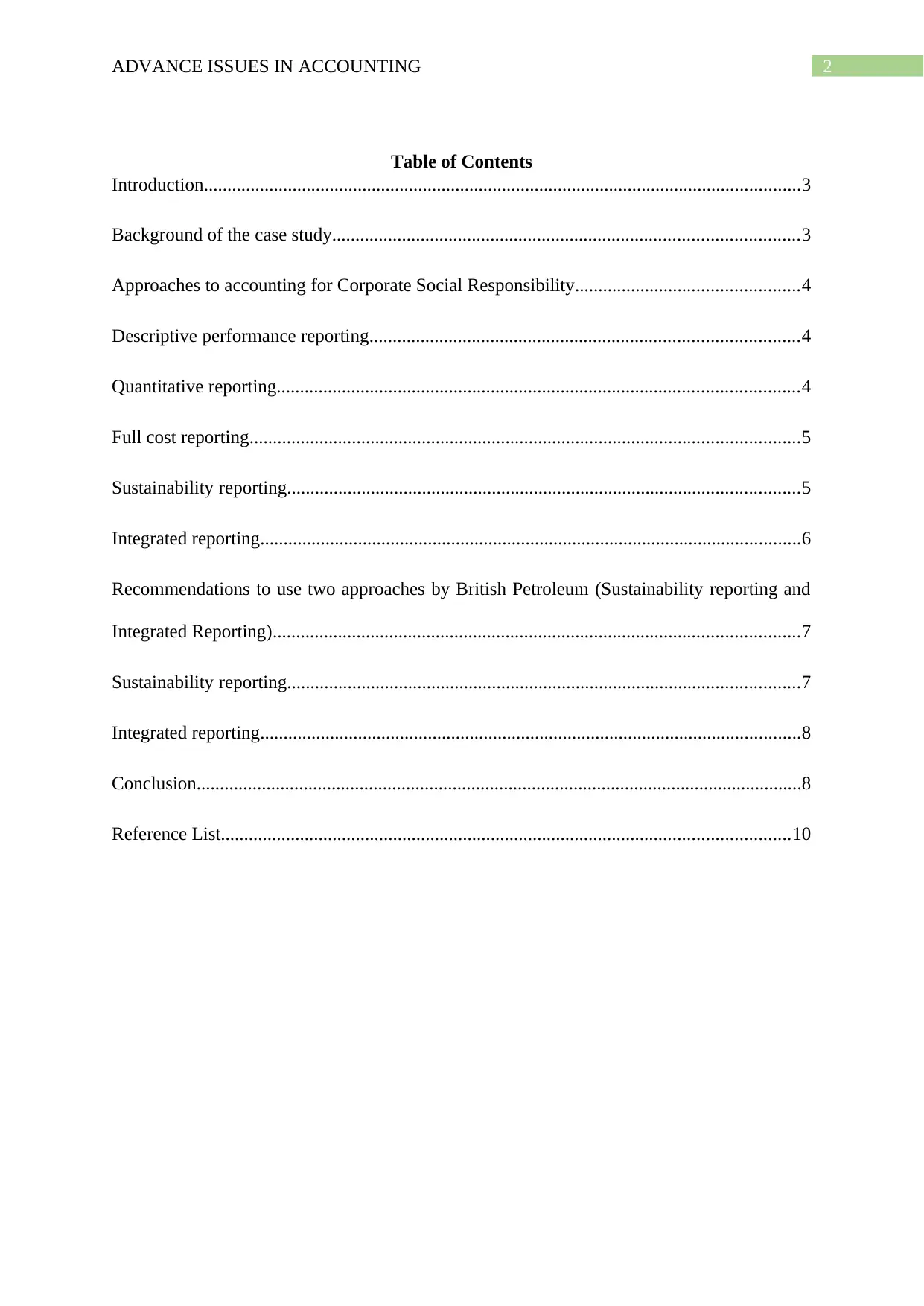
2ADVANCE ISSUES IN ACCOUNTING
Table of Contents
Introduction................................................................................................................................3
Background of the case study....................................................................................................3
Approaches to accounting for Corporate Social Responsibility................................................4
Descriptive performance reporting............................................................................................4
Quantitative reporting................................................................................................................4
Full cost reporting......................................................................................................................5
Sustainability reporting..............................................................................................................5
Integrated reporting....................................................................................................................6
Recommendations to use two approaches by British Petroleum (Sustainability reporting and
Integrated Reporting).................................................................................................................7
Sustainability reporting..............................................................................................................7
Integrated reporting....................................................................................................................8
Conclusion..................................................................................................................................8
Reference List..........................................................................................................................10
Table of Contents
Introduction................................................................................................................................3
Background of the case study....................................................................................................3
Approaches to accounting for Corporate Social Responsibility................................................4
Descriptive performance reporting............................................................................................4
Quantitative reporting................................................................................................................4
Full cost reporting......................................................................................................................5
Sustainability reporting..............................................................................................................5
Integrated reporting....................................................................................................................6
Recommendations to use two approaches by British Petroleum (Sustainability reporting and
Integrated Reporting).................................................................................................................7
Sustainability reporting..............................................................................................................7
Integrated reporting....................................................................................................................8
Conclusion..................................................................................................................................8
Reference List..........................................................................................................................10
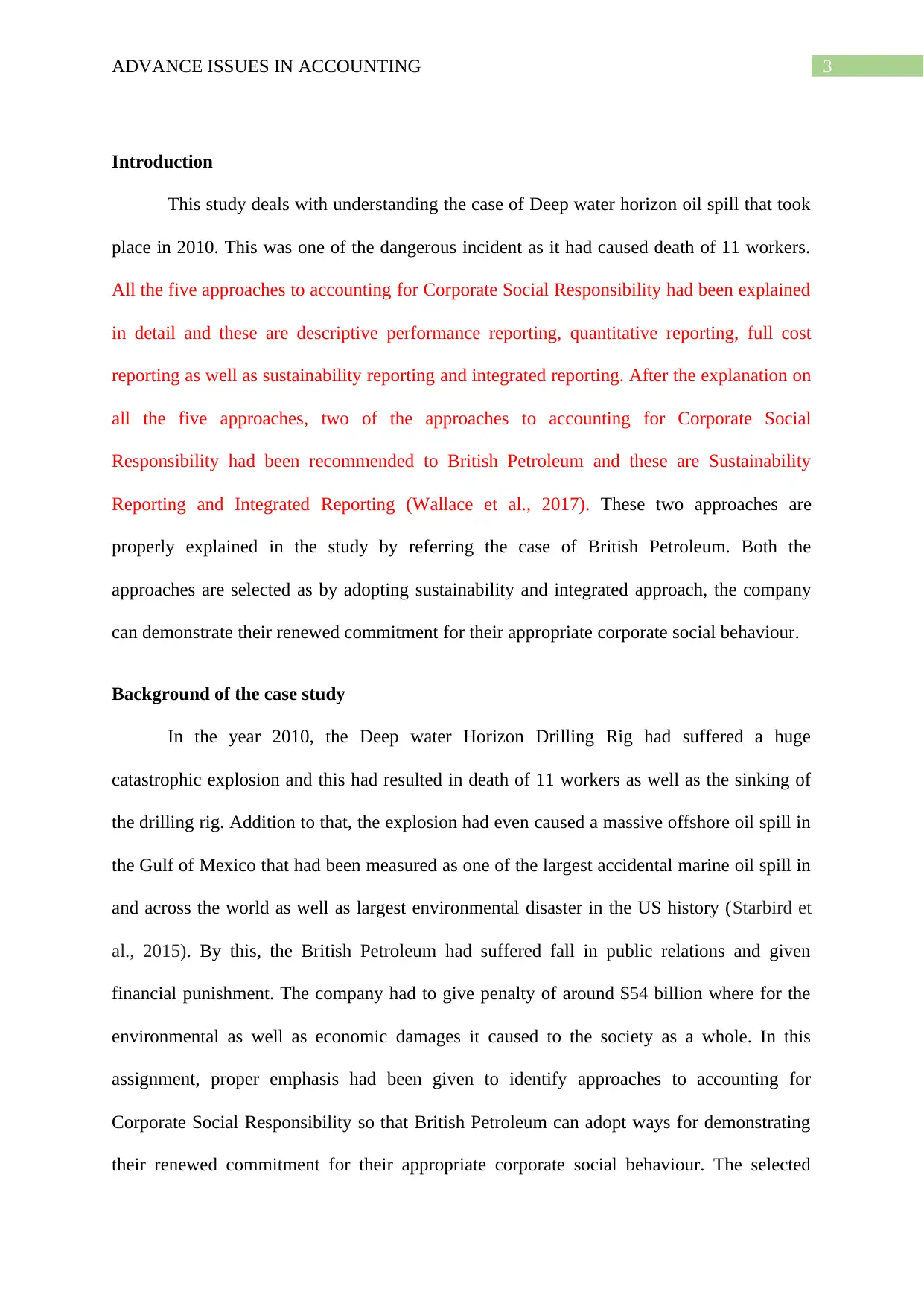
3ADVANCE ISSUES IN ACCOUNTING
Introduction
This study deals with understanding the case of Deep water horizon oil spill that took
place in 2010. This was one of the dangerous incident as it had caused death of 11 workers.
All the five approaches to accounting for Corporate Social Responsibility had been explained
in detail and these are descriptive performance reporting, quantitative reporting, full cost
reporting as well as sustainability reporting and integrated reporting. After the explanation on
all the five approaches, two of the approaches to accounting for Corporate Social
Responsibility had been recommended to British Petroleum and these are Sustainability
Reporting and Integrated Reporting (Wallace et al., 2017). These two approaches are
properly explained in the study by referring the case of British Petroleum. Both the
approaches are selected as by adopting sustainability and integrated approach, the company
can demonstrate their renewed commitment for their appropriate corporate social behaviour.
Background of the case study
In the year 2010, the Deep water Horizon Drilling Rig had suffered a huge
catastrophic explosion and this had resulted in death of 11 workers as well as the sinking of
the drilling rig. Addition to that, the explosion had even caused a massive offshore oil spill in
the Gulf of Mexico that had been measured as one of the largest accidental marine oil spill in
and across the world as well as largest environmental disaster in the US history (Starbird et
al., 2015). By this, the British Petroleum had suffered fall in public relations and given
financial punishment. The company had to give penalty of around $54 billion where for the
environmental as well as economic damages it caused to the society as a whole. In this
assignment, proper emphasis had been given to identify approaches to accounting for
Corporate Social Responsibility so that British Petroleum can adopt ways for demonstrating
their renewed commitment for their appropriate corporate social behaviour. The selected
Introduction
This study deals with understanding the case of Deep water horizon oil spill that took
place in 2010. This was one of the dangerous incident as it had caused death of 11 workers.
All the five approaches to accounting for Corporate Social Responsibility had been explained
in detail and these are descriptive performance reporting, quantitative reporting, full cost
reporting as well as sustainability reporting and integrated reporting. After the explanation on
all the five approaches, two of the approaches to accounting for Corporate Social
Responsibility had been recommended to British Petroleum and these are Sustainability
Reporting and Integrated Reporting (Wallace et al., 2017). These two approaches are
properly explained in the study by referring the case of British Petroleum. Both the
approaches are selected as by adopting sustainability and integrated approach, the company
can demonstrate their renewed commitment for their appropriate corporate social behaviour.
Background of the case study
In the year 2010, the Deep water Horizon Drilling Rig had suffered a huge
catastrophic explosion and this had resulted in death of 11 workers as well as the sinking of
the drilling rig. Addition to that, the explosion had even caused a massive offshore oil spill in
the Gulf of Mexico that had been measured as one of the largest accidental marine oil spill in
and across the world as well as largest environmental disaster in the US history (Starbird et
al., 2015). By this, the British Petroleum had suffered fall in public relations and given
financial punishment. The company had to give penalty of around $54 billion where for the
environmental as well as economic damages it caused to the society as a whole. In this
assignment, proper emphasis had been given to identify approaches to accounting for
Corporate Social Responsibility so that British Petroleum can adopt ways for demonstrating
their renewed commitment for their appropriate corporate social behaviour. The selected
⊘ This is a preview!⊘
Do you want full access?
Subscribe today to unlock all pages.

Trusted by 1+ million students worldwide
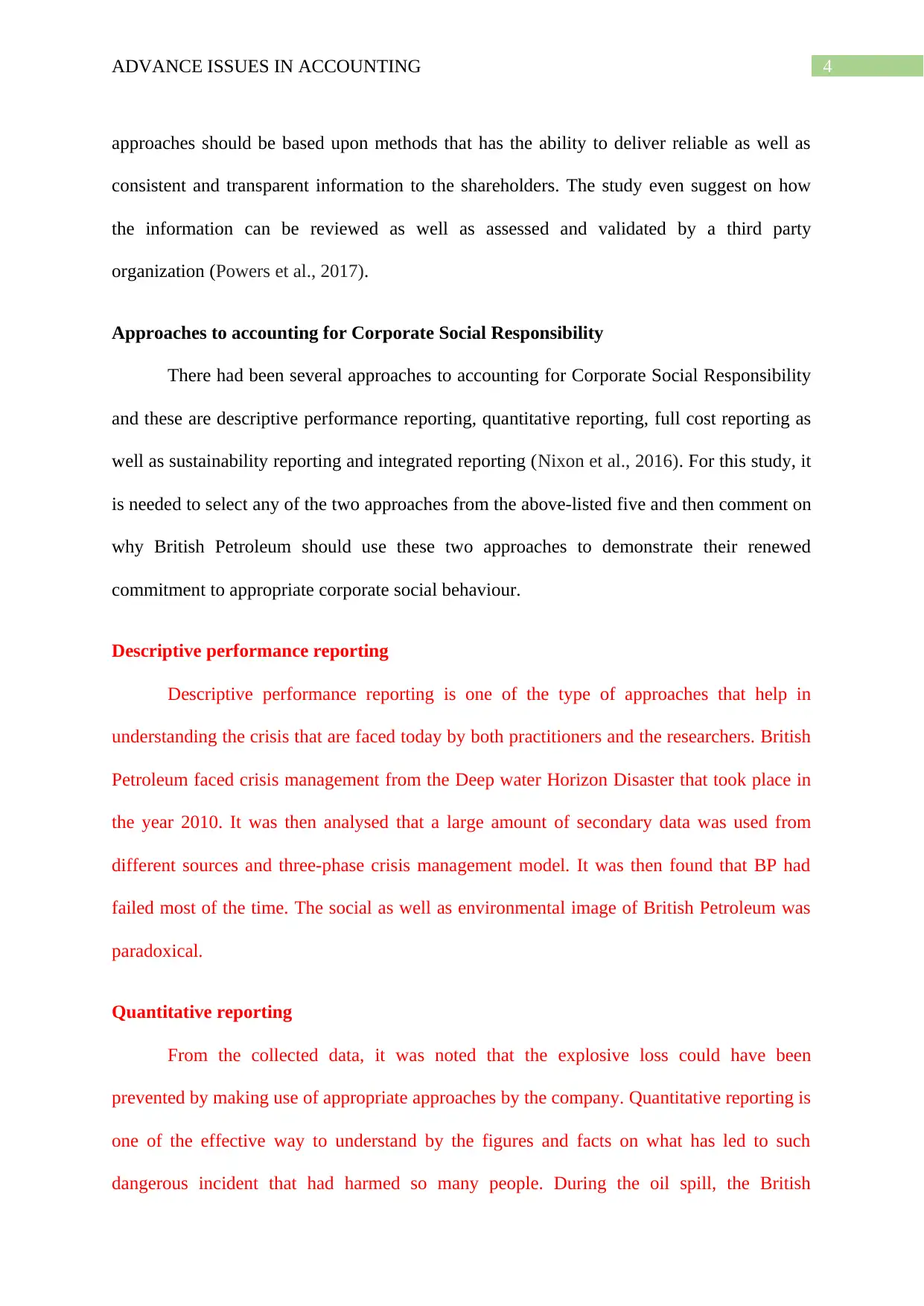
4ADVANCE ISSUES IN ACCOUNTING
approaches should be based upon methods that has the ability to deliver reliable as well as
consistent and transparent information to the shareholders. The study even suggest on how
the information can be reviewed as well as assessed and validated by a third party
organization (Powers et al., 2017).
Approaches to accounting for Corporate Social Responsibility
There had been several approaches to accounting for Corporate Social Responsibility
and these are descriptive performance reporting, quantitative reporting, full cost reporting as
well as sustainability reporting and integrated reporting (Nixon et al., 2016). For this study, it
is needed to select any of the two approaches from the above-listed five and then comment on
why British Petroleum should use these two approaches to demonstrate their renewed
commitment to appropriate corporate social behaviour.
Descriptive performance reporting
Descriptive performance reporting is one of the type of approaches that help in
understanding the crisis that are faced today by both practitioners and the researchers. British
Petroleum faced crisis management from the Deep water Horizon Disaster that took place in
the year 2010. It was then analysed that a large amount of secondary data was used from
different sources and three-phase crisis management model. It was then found that BP had
failed most of the time. The social as well as environmental image of British Petroleum was
paradoxical.
Quantitative reporting
From the collected data, it was noted that the explosive loss could have been
prevented by making use of appropriate approaches by the company. Quantitative reporting is
one of the effective way to understand by the figures and facts on what has led to such
dangerous incident that had harmed so many people. During the oil spill, the British
approaches should be based upon methods that has the ability to deliver reliable as well as
consistent and transparent information to the shareholders. The study even suggest on how
the information can be reviewed as well as assessed and validated by a third party
organization (Powers et al., 2017).
Approaches to accounting for Corporate Social Responsibility
There had been several approaches to accounting for Corporate Social Responsibility
and these are descriptive performance reporting, quantitative reporting, full cost reporting as
well as sustainability reporting and integrated reporting (Nixon et al., 2016). For this study, it
is needed to select any of the two approaches from the above-listed five and then comment on
why British Petroleum should use these two approaches to demonstrate their renewed
commitment to appropriate corporate social behaviour.
Descriptive performance reporting
Descriptive performance reporting is one of the type of approaches that help in
understanding the crisis that are faced today by both practitioners and the researchers. British
Petroleum faced crisis management from the Deep water Horizon Disaster that took place in
the year 2010. It was then analysed that a large amount of secondary data was used from
different sources and three-phase crisis management model. It was then found that BP had
failed most of the time. The social as well as environmental image of British Petroleum was
paradoxical.
Quantitative reporting
From the collected data, it was noted that the explosive loss could have been
prevented by making use of appropriate approaches by the company. Quantitative reporting is
one of the effective way to understand by the figures and facts on what has led to such
dangerous incident that had harmed so many people. During the oil spill, the British
Paraphrase This Document
Need a fresh take? Get an instant paraphrase of this document with our AI Paraphraser
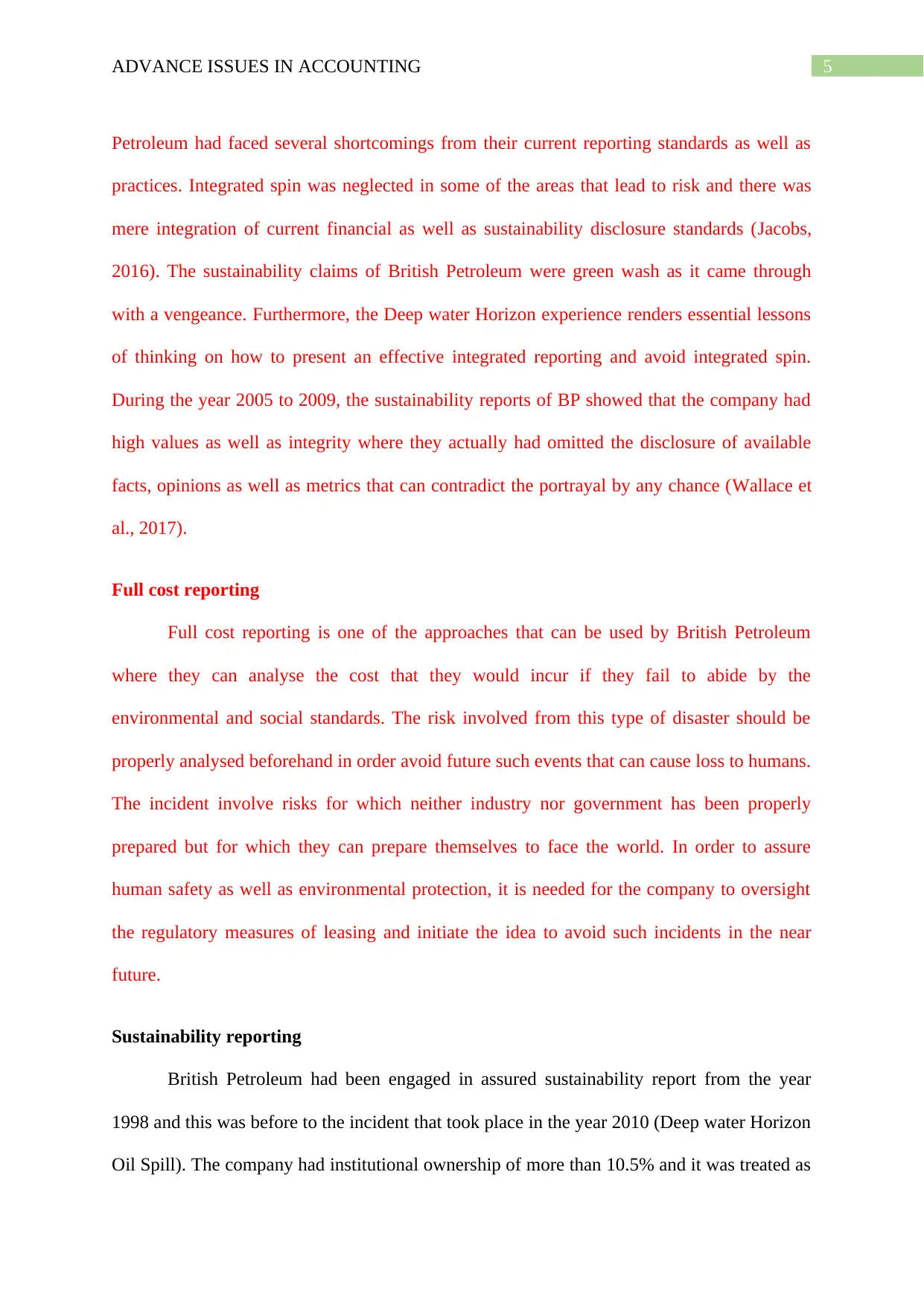
5ADVANCE ISSUES IN ACCOUNTING
Petroleum had faced several shortcomings from their current reporting standards as well as
practices. Integrated spin was neglected in some of the areas that lead to risk and there was
mere integration of current financial as well as sustainability disclosure standards (Jacobs,
2016). The sustainability claims of British Petroleum were green wash as it came through
with a vengeance. Furthermore, the Deep water Horizon experience renders essential lessons
of thinking on how to present an effective integrated reporting and avoid integrated spin.
During the year 2005 to 2009, the sustainability reports of BP showed that the company had
high values as well as integrity where they actually had omitted the disclosure of available
facts, opinions as well as metrics that can contradict the portrayal by any chance (Wallace et
al., 2017).
Full cost reporting
Full cost reporting is one of the approaches that can be used by British Petroleum
where they can analyse the cost that they would incur if they fail to abide by the
environmental and social standards. The risk involved from this type of disaster should be
properly analysed beforehand in order avoid future such events that can cause loss to humans.
The incident involve risks for which neither industry nor government has been properly
prepared but for which they can prepare themselves to face the world. In order to assure
human safety as well as environmental protection, it is needed for the company to oversight
the regulatory measures of leasing and initiate the idea to avoid such incidents in the near
future.
Sustainability reporting
British Petroleum had been engaged in assured sustainability report from the year
1998 and this was before to the incident that took place in the year 2010 (Deep water Horizon
Oil Spill). The company had institutional ownership of more than 10.5% and it was treated as
Petroleum had faced several shortcomings from their current reporting standards as well as
practices. Integrated spin was neglected in some of the areas that lead to risk and there was
mere integration of current financial as well as sustainability disclosure standards (Jacobs,
2016). The sustainability claims of British Petroleum were green wash as it came through
with a vengeance. Furthermore, the Deep water Horizon experience renders essential lessons
of thinking on how to present an effective integrated reporting and avoid integrated spin.
During the year 2005 to 2009, the sustainability reports of BP showed that the company had
high values as well as integrity where they actually had omitted the disclosure of available
facts, opinions as well as metrics that can contradict the portrayal by any chance (Wallace et
al., 2017).
Full cost reporting
Full cost reporting is one of the approaches that can be used by British Petroleum
where they can analyse the cost that they would incur if they fail to abide by the
environmental and social standards. The risk involved from this type of disaster should be
properly analysed beforehand in order avoid future such events that can cause loss to humans.
The incident involve risks for which neither industry nor government has been properly
prepared but for which they can prepare themselves to face the world. In order to assure
human safety as well as environmental protection, it is needed for the company to oversight
the regulatory measures of leasing and initiate the idea to avoid such incidents in the near
future.
Sustainability reporting
British Petroleum had been engaged in assured sustainability report from the year
1998 and this was before to the incident that took place in the year 2010 (Deep water Horizon
Oil Spill). The company had institutional ownership of more than 10.5% and it was treated as
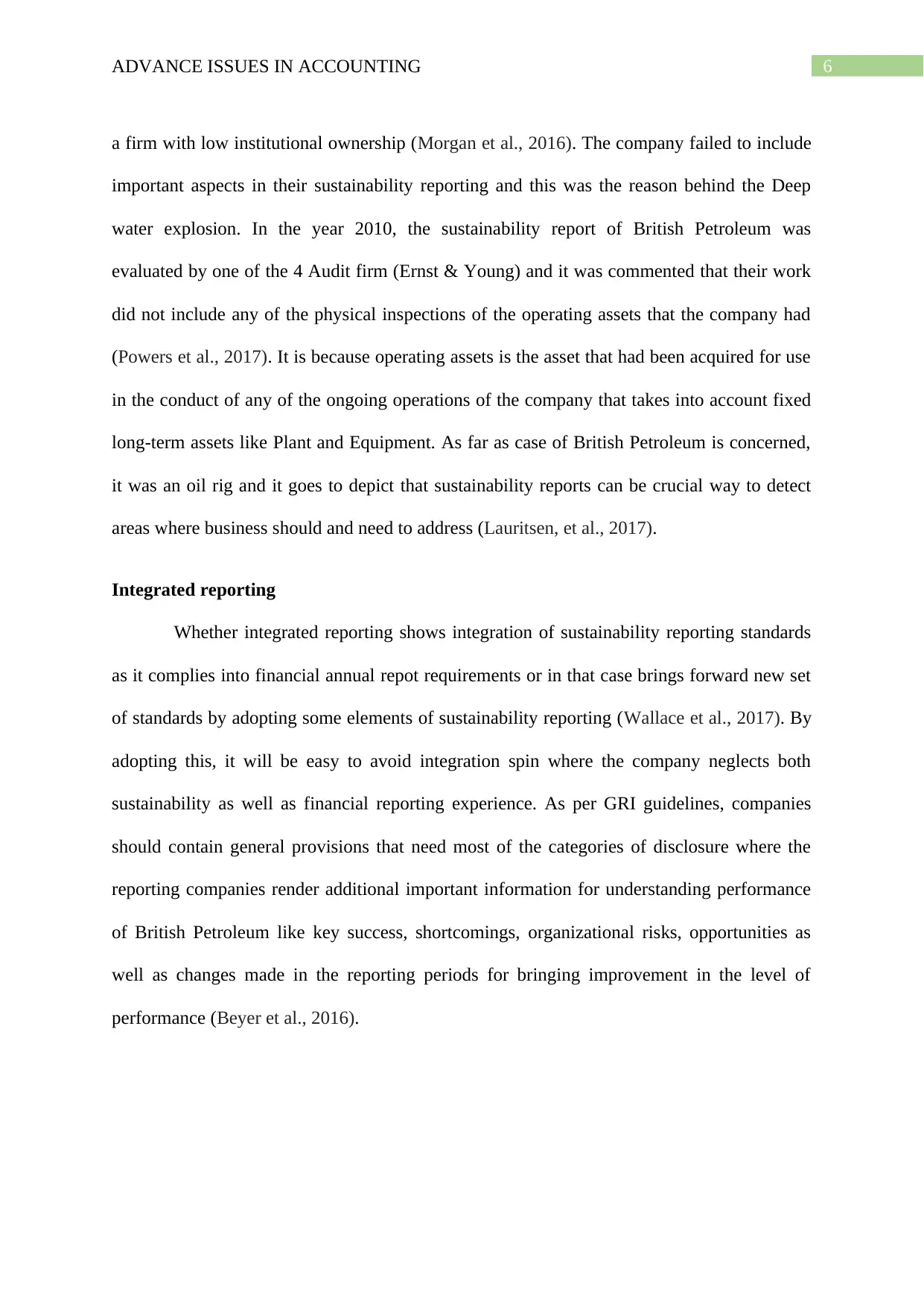
6ADVANCE ISSUES IN ACCOUNTING
a firm with low institutional ownership (Morgan et al., 2016). The company failed to include
important aspects in their sustainability reporting and this was the reason behind the Deep
water explosion. In the year 2010, the sustainability report of British Petroleum was
evaluated by one of the 4 Audit firm (Ernst & Young) and it was commented that their work
did not include any of the physical inspections of the operating assets that the company had
(Powers et al., 2017). It is because operating assets is the asset that had been acquired for use
in the conduct of any of the ongoing operations of the company that takes into account fixed
long-term assets like Plant and Equipment. As far as case of British Petroleum is concerned,
it was an oil rig and it goes to depict that sustainability reports can be crucial way to detect
areas where business should and need to address (Lauritsen, et al., 2017).
Integrated reporting
Whether integrated reporting shows integration of sustainability reporting standards
as it complies into financial annual repot requirements or in that case brings forward new set
of standards by adopting some elements of sustainability reporting (Wallace et al., 2017). By
adopting this, it will be easy to avoid integration spin where the company neglects both
sustainability as well as financial reporting experience. As per GRI guidelines, companies
should contain general provisions that need most of the categories of disclosure where the
reporting companies render additional important information for understanding performance
of British Petroleum like key success, shortcomings, organizational risks, opportunities as
well as changes made in the reporting periods for bringing improvement in the level of
performance (Beyer et al., 2016).
a firm with low institutional ownership (Morgan et al., 2016). The company failed to include
important aspects in their sustainability reporting and this was the reason behind the Deep
water explosion. In the year 2010, the sustainability report of British Petroleum was
evaluated by one of the 4 Audit firm (Ernst & Young) and it was commented that their work
did not include any of the physical inspections of the operating assets that the company had
(Powers et al., 2017). It is because operating assets is the asset that had been acquired for use
in the conduct of any of the ongoing operations of the company that takes into account fixed
long-term assets like Plant and Equipment. As far as case of British Petroleum is concerned,
it was an oil rig and it goes to depict that sustainability reports can be crucial way to detect
areas where business should and need to address (Lauritsen, et al., 2017).
Integrated reporting
Whether integrated reporting shows integration of sustainability reporting standards
as it complies into financial annual repot requirements or in that case brings forward new set
of standards by adopting some elements of sustainability reporting (Wallace et al., 2017). By
adopting this, it will be easy to avoid integration spin where the company neglects both
sustainability as well as financial reporting experience. As per GRI guidelines, companies
should contain general provisions that need most of the categories of disclosure where the
reporting companies render additional important information for understanding performance
of British Petroleum like key success, shortcomings, organizational risks, opportunities as
well as changes made in the reporting periods for bringing improvement in the level of
performance (Beyer et al., 2016).
⊘ This is a preview!⊘
Do you want full access?
Subscribe today to unlock all pages.

Trusted by 1+ million students worldwide
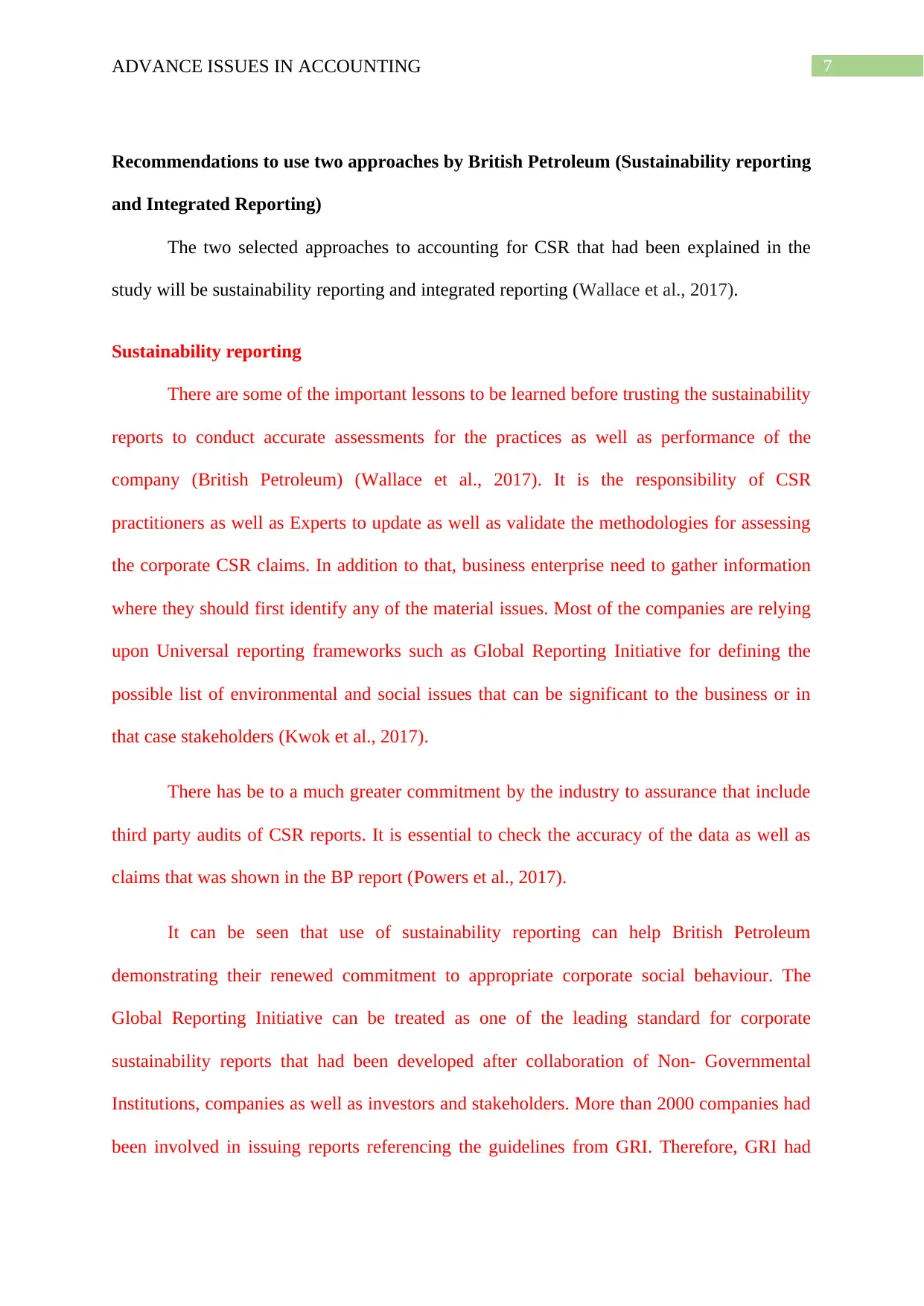
7ADVANCE ISSUES IN ACCOUNTING
Recommendations to use two approaches by British Petroleum (Sustainability reporting
and Integrated Reporting)
The two selected approaches to accounting for CSR that had been explained in the
study will be sustainability reporting and integrated reporting (Wallace et al., 2017).
Sustainability reporting
There are some of the important lessons to be learned before trusting the sustainability
reports to conduct accurate assessments for the practices as well as performance of the
company (British Petroleum) (Wallace et al., 2017). It is the responsibility of CSR
practitioners as well as Experts to update as well as validate the methodologies for assessing
the corporate CSR claims. In addition to that, business enterprise need to gather information
where they should first identify any of the material issues. Most of the companies are relying
upon Universal reporting frameworks such as Global Reporting Initiative for defining the
possible list of environmental and social issues that can be significant to the business or in
that case stakeholders (Kwok et al., 2017).
There has be to a much greater commitment by the industry to assurance that include
third party audits of CSR reports. It is essential to check the accuracy of the data as well as
claims that was shown in the BP report (Powers et al., 2017).
It can be seen that use of sustainability reporting can help British Petroleum
demonstrating their renewed commitment to appropriate corporate social behaviour. The
Global Reporting Initiative can be treated as one of the leading standard for corporate
sustainability reports that had been developed after collaboration of Non- Governmental
Institutions, companies as well as investors and stakeholders. More than 2000 companies had
been involved in issuing reports referencing the guidelines from GRI. Therefore, GRI had
Recommendations to use two approaches by British Petroleum (Sustainability reporting
and Integrated Reporting)
The two selected approaches to accounting for CSR that had been explained in the
study will be sustainability reporting and integrated reporting (Wallace et al., 2017).
Sustainability reporting
There are some of the important lessons to be learned before trusting the sustainability
reports to conduct accurate assessments for the practices as well as performance of the
company (British Petroleum) (Wallace et al., 2017). It is the responsibility of CSR
practitioners as well as Experts to update as well as validate the methodologies for assessing
the corporate CSR claims. In addition to that, business enterprise need to gather information
where they should first identify any of the material issues. Most of the companies are relying
upon Universal reporting frameworks such as Global Reporting Initiative for defining the
possible list of environmental and social issues that can be significant to the business or in
that case stakeholders (Kwok et al., 2017).
There has be to a much greater commitment by the industry to assurance that include
third party audits of CSR reports. It is essential to check the accuracy of the data as well as
claims that was shown in the BP report (Powers et al., 2017).
It can be seen that use of sustainability reporting can help British Petroleum
demonstrating their renewed commitment to appropriate corporate social behaviour. The
Global Reporting Initiative can be treated as one of the leading standard for corporate
sustainability reports that had been developed after collaboration of Non- Governmental
Institutions, companies as well as investors and stakeholders. More than 2000 companies had
been involved in issuing reports referencing the guidelines from GRI. Therefore, GRI had
Paraphrase This Document
Need a fresh take? Get an instant paraphrase of this document with our AI Paraphraser
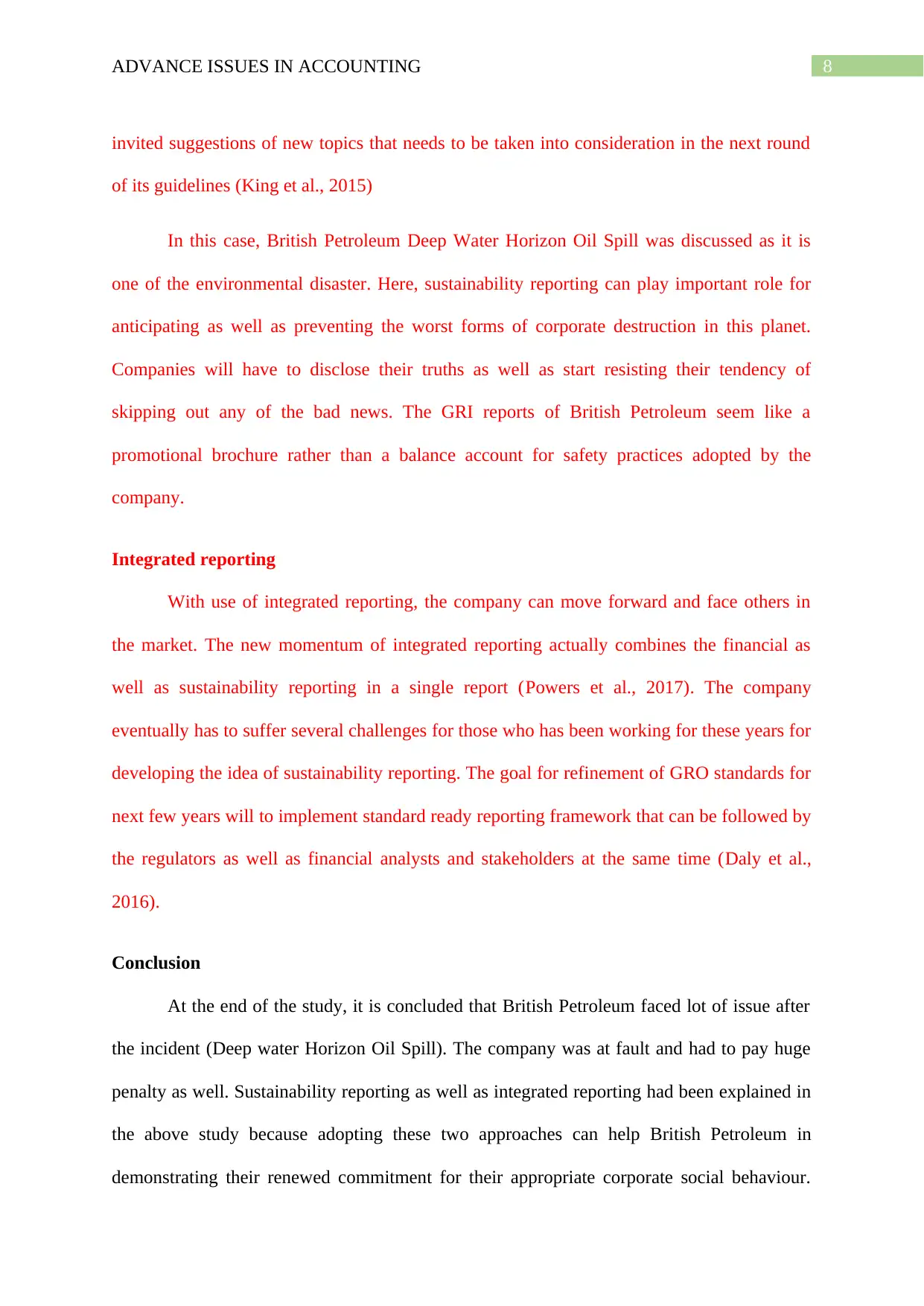
8ADVANCE ISSUES IN ACCOUNTING
invited suggestions of new topics that needs to be taken into consideration in the next round
of its guidelines (King et al., 2015)
In this case, British Petroleum Deep Water Horizon Oil Spill was discussed as it is
one of the environmental disaster. Here, sustainability reporting can play important role for
anticipating as well as preventing the worst forms of corporate destruction in this planet.
Companies will have to disclose their truths as well as start resisting their tendency of
skipping out any of the bad news. The GRI reports of British Petroleum seem like a
promotional brochure rather than a balance account for safety practices adopted by the
company.
Integrated reporting
With use of integrated reporting, the company can move forward and face others in
the market. The new momentum of integrated reporting actually combines the financial as
well as sustainability reporting in a single report (Powers et al., 2017). The company
eventually has to suffer several challenges for those who has been working for these years for
developing the idea of sustainability reporting. The goal for refinement of GRO standards for
next few years will to implement standard ready reporting framework that can be followed by
the regulators as well as financial analysts and stakeholders at the same time (Daly et al.,
2016).
Conclusion
At the end of the study, it is concluded that British Petroleum faced lot of issue after
the incident (Deep water Horizon Oil Spill). The company was at fault and had to pay huge
penalty as well. Sustainability reporting as well as integrated reporting had been explained in
the above study because adopting these two approaches can help British Petroleum in
demonstrating their renewed commitment for their appropriate corporate social behaviour.
invited suggestions of new topics that needs to be taken into consideration in the next round
of its guidelines (King et al., 2015)
In this case, British Petroleum Deep Water Horizon Oil Spill was discussed as it is
one of the environmental disaster. Here, sustainability reporting can play important role for
anticipating as well as preventing the worst forms of corporate destruction in this planet.
Companies will have to disclose their truths as well as start resisting their tendency of
skipping out any of the bad news. The GRI reports of British Petroleum seem like a
promotional brochure rather than a balance account for safety practices adopted by the
company.
Integrated reporting
With use of integrated reporting, the company can move forward and face others in
the market. The new momentum of integrated reporting actually combines the financial as
well as sustainability reporting in a single report (Powers et al., 2017). The company
eventually has to suffer several challenges for those who has been working for these years for
developing the idea of sustainability reporting. The goal for refinement of GRO standards for
next few years will to implement standard ready reporting framework that can be followed by
the regulators as well as financial analysts and stakeholders at the same time (Daly et al.,
2016).
Conclusion
At the end of the study, it is concluded that British Petroleum faced lot of issue after
the incident (Deep water Horizon Oil Spill). The company was at fault and had to pay huge
penalty as well. Sustainability reporting as well as integrated reporting had been explained in
the above study because adopting these two approaches can help British Petroleum in
demonstrating their renewed commitment for their appropriate corporate social behaviour.

9ADVANCE ISSUES IN ACCOUNTING
Integration and use of sustainable practices can help in bringing disclosure of sustainability
data into the context of legal credibility checks as well as enforcement at the same time.
These approaches had been utilized by Global reporting Initiative as it shows the process of
self-portrayal. Complete analysis had been done by understanding both the approaches where
the company should adapt the principles as applicable to all the disclosures to the investors.
Integration and use of sustainable practices can help in bringing disclosure of sustainability
data into the context of legal credibility checks as well as enforcement at the same time.
These approaches had been utilized by Global reporting Initiative as it shows the process of
self-portrayal. Complete analysis had been done by understanding both the approaches where
the company should adapt the principles as applicable to all the disclosures to the investors.
⊘ This is a preview!⊘
Do you want full access?
Subscribe today to unlock all pages.

Trusted by 1+ million students worldwide
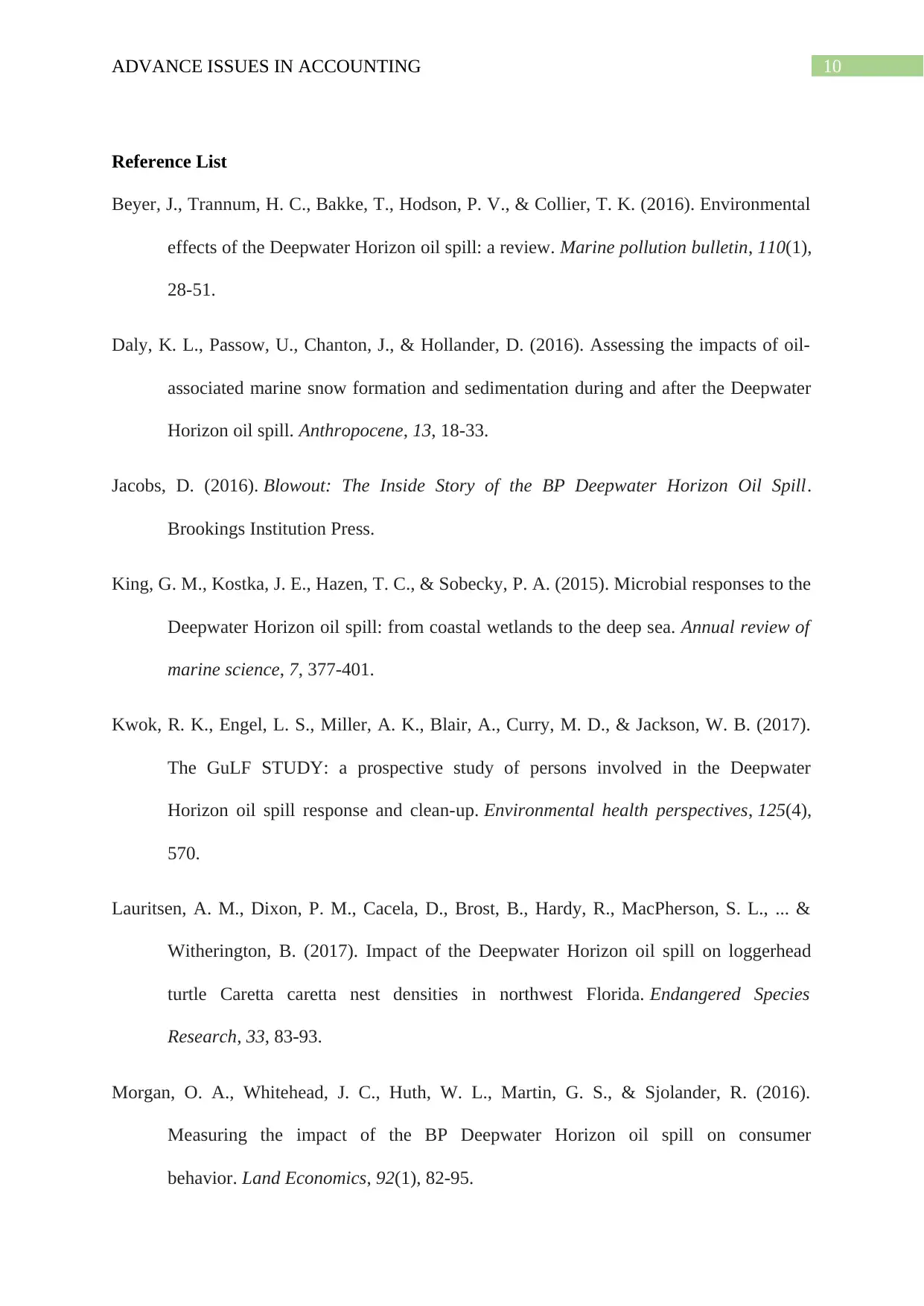
10ADVANCE ISSUES IN ACCOUNTING
Reference List
Beyer, J., Trannum, H. C., Bakke, T., Hodson, P. V., & Collier, T. K. (2016). Environmental
effects of the Deepwater Horizon oil spill: a review. Marine pollution bulletin, 110(1),
28-51.
Daly, K. L., Passow, U., Chanton, J., & Hollander, D. (2016). Assessing the impacts of oil-
associated marine snow formation and sedimentation during and after the Deepwater
Horizon oil spill. Anthropocene, 13, 18-33.
Jacobs, D. (2016). Blowout: The Inside Story of the BP Deepwater Horizon Oil Spill.
Brookings Institution Press.
King, G. M., Kostka, J. E., Hazen, T. C., & Sobecky, P. A. (2015). Microbial responses to the
Deepwater Horizon oil spill: from coastal wetlands to the deep sea. Annual review of
marine science, 7, 377-401.
Kwok, R. K., Engel, L. S., Miller, A. K., Blair, A., Curry, M. D., & Jackson, W. B. (2017).
The GuLF STUDY: a prospective study of persons involved in the Deepwater
Horizon oil spill response and clean-up. Environmental health perspectives, 125(4),
570.
Lauritsen, A. M., Dixon, P. M., Cacela, D., Brost, B., Hardy, R., MacPherson, S. L., ... &
Witherington, B. (2017). Impact of the Deepwater Horizon oil spill on loggerhead
turtle Caretta caretta nest densities in northwest Florida. Endangered Species
Research, 33, 83-93.
Morgan, O. A., Whitehead, J. C., Huth, W. L., Martin, G. S., & Sjolander, R. (2016).
Measuring the impact of the BP Deepwater Horizon oil spill on consumer
behavior. Land Economics, 92(1), 82-95.
Reference List
Beyer, J., Trannum, H. C., Bakke, T., Hodson, P. V., & Collier, T. K. (2016). Environmental
effects of the Deepwater Horizon oil spill: a review. Marine pollution bulletin, 110(1),
28-51.
Daly, K. L., Passow, U., Chanton, J., & Hollander, D. (2016). Assessing the impacts of oil-
associated marine snow formation and sedimentation during and after the Deepwater
Horizon oil spill. Anthropocene, 13, 18-33.
Jacobs, D. (2016). Blowout: The Inside Story of the BP Deepwater Horizon Oil Spill.
Brookings Institution Press.
King, G. M., Kostka, J. E., Hazen, T. C., & Sobecky, P. A. (2015). Microbial responses to the
Deepwater Horizon oil spill: from coastal wetlands to the deep sea. Annual review of
marine science, 7, 377-401.
Kwok, R. K., Engel, L. S., Miller, A. K., Blair, A., Curry, M. D., & Jackson, W. B. (2017).
The GuLF STUDY: a prospective study of persons involved in the Deepwater
Horizon oil spill response and clean-up. Environmental health perspectives, 125(4),
570.
Lauritsen, A. M., Dixon, P. M., Cacela, D., Brost, B., Hardy, R., MacPherson, S. L., ... &
Witherington, B. (2017). Impact of the Deepwater Horizon oil spill on loggerhead
turtle Caretta caretta nest densities in northwest Florida. Endangered Species
Research, 33, 83-93.
Morgan, O. A., Whitehead, J. C., Huth, W. L., Martin, G. S., & Sjolander, R. (2016).
Measuring the impact of the BP Deepwater Horizon oil spill on consumer
behavior. Land Economics, 92(1), 82-95.
Paraphrase This Document
Need a fresh take? Get an instant paraphrase of this document with our AI Paraphraser
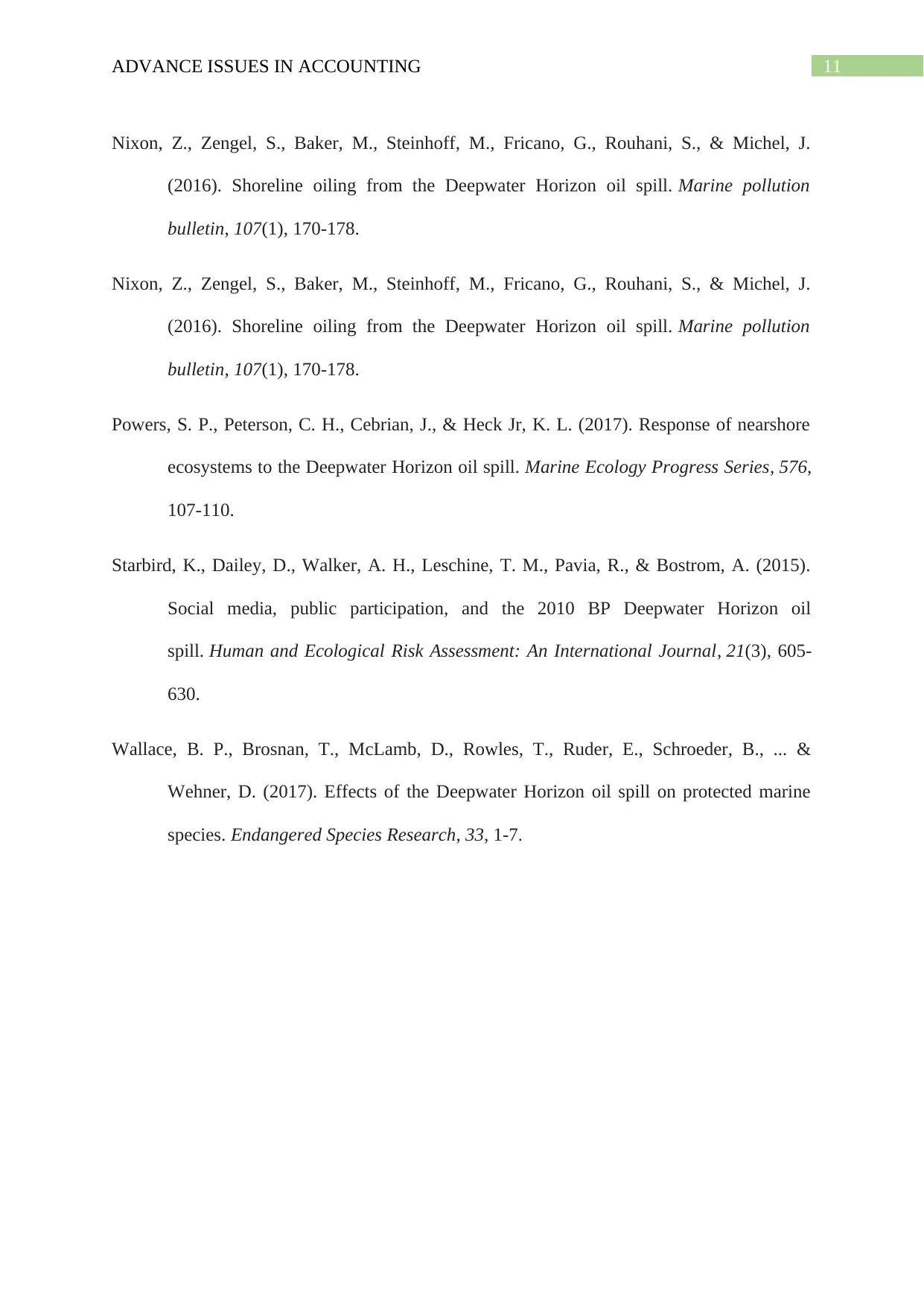
11ADVANCE ISSUES IN ACCOUNTING
Nixon, Z., Zengel, S., Baker, M., Steinhoff, M., Fricano, G., Rouhani, S., & Michel, J.
(2016). Shoreline oiling from the Deepwater Horizon oil spill. Marine pollution
bulletin, 107(1), 170-178.
Nixon, Z., Zengel, S., Baker, M., Steinhoff, M., Fricano, G., Rouhani, S., & Michel, J.
(2016). Shoreline oiling from the Deepwater Horizon oil spill. Marine pollution
bulletin, 107(1), 170-178.
Powers, S. P., Peterson, C. H., Cebrian, J., & Heck Jr, K. L. (2017). Response of nearshore
ecosystems to the Deepwater Horizon oil spill. Marine Ecology Progress Series, 576,
107-110.
Starbird, K., Dailey, D., Walker, A. H., Leschine, T. M., Pavia, R., & Bostrom, A. (2015).
Social media, public participation, and the 2010 BP Deepwater Horizon oil
spill. Human and Ecological Risk Assessment: An International Journal, 21(3), 605-
630.
Wallace, B. P., Brosnan, T., McLamb, D., Rowles, T., Ruder, E., Schroeder, B., ... &
Wehner, D. (2017). Effects of the Deepwater Horizon oil spill on protected marine
species. Endangered Species Research, 33, 1-7.
Nixon, Z., Zengel, S., Baker, M., Steinhoff, M., Fricano, G., Rouhani, S., & Michel, J.
(2016). Shoreline oiling from the Deepwater Horizon oil spill. Marine pollution
bulletin, 107(1), 170-178.
Nixon, Z., Zengel, S., Baker, M., Steinhoff, M., Fricano, G., Rouhani, S., & Michel, J.
(2016). Shoreline oiling from the Deepwater Horizon oil spill. Marine pollution
bulletin, 107(1), 170-178.
Powers, S. P., Peterson, C. H., Cebrian, J., & Heck Jr, K. L. (2017). Response of nearshore
ecosystems to the Deepwater Horizon oil spill. Marine Ecology Progress Series, 576,
107-110.
Starbird, K., Dailey, D., Walker, A. H., Leschine, T. M., Pavia, R., & Bostrom, A. (2015).
Social media, public participation, and the 2010 BP Deepwater Horizon oil
spill. Human and Ecological Risk Assessment: An International Journal, 21(3), 605-
630.
Wallace, B. P., Brosnan, T., McLamb, D., Rowles, T., Ruder, E., Schroeder, B., ... &
Wehner, D. (2017). Effects of the Deepwater Horizon oil spill on protected marine
species. Endangered Species Research, 33, 1-7.
1 out of 11
Related Documents
Your All-in-One AI-Powered Toolkit for Academic Success.
+13062052269
info@desklib.com
Available 24*7 on WhatsApp / Email
![[object Object]](/_next/static/media/star-bottom.7253800d.svg)
Unlock your academic potential
Copyright © 2020–2026 A2Z Services. All Rights Reserved. Developed and managed by ZUCOL.





